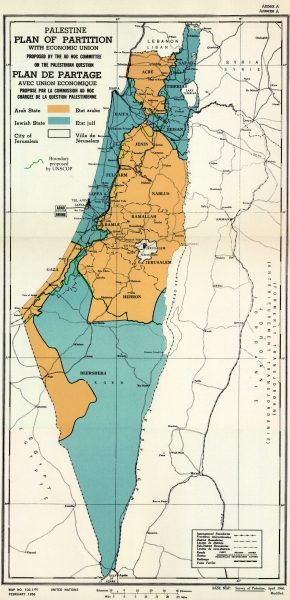Analysis
The 1947 UN Partition Plan
Category:
[ssba]
29 November is the 70th anniversary of the 1947 United Nations Partition Plan for Palestine. The BICOM research team has produced a briefing explaining the history of the plan, consequences of the UN vote and its continued relevance to the peace process.
Key points
- UN General Assembly Resolution 181 (hereinafter the partition plan) sought to provide a solution to what was perceived as a conflict of two peoples with conflicting rights and claims in Palestine / the Land of Israel and established the principle of two states for two peoples that is still relevant today.
- The decision by UN Special Committee on Palestine (UNSCOP) to recommend partition resulted from a variety of reasons: the impressive institutions and organisational infrastructure established by Jewish community in Mandatory Palestine; Its leaders’ willingness to cooperate with UNSCOP and accept the principle of partition – in contrast to the Arab Higher Committee who boycotted UNSCOP and rejected both its majority and minority recommendations; and the pressing need to find a solution to the hundreds of thousands of Jewish displaced persons in Europe who had survived the Holocaust.
- The rejection of the UN General Assembly Resolution 181 by Arab states and the subsequent war in 1948 eroded the relevancy of the proposed borders of the Partition Plan. However, even 70 years on, the principle of partition remains the accepted paradigm in the international community for resolution to the Israeli-Palestinian conflict.
- Israel’s Declaration of Independence bases the legitimacy of Jewish statehood on both the Jewish people’s historic rights in Palestine / the Land of Israel as well as the partition plan approved by the international community. The proclamation announces that Israel was declared “by virtue of our natural and historic right and on the strength of the resolution of the United Nations General Assembly”.
- This paper details background to the recommendation of partition and the partition plan’s acceptance by the international community on 29 November 1947 as well as the consequences of the vote. It also describes the history of the principle of partition as well as alternatives that were suggested at the time.
The full briefing is available as a PDF below.
